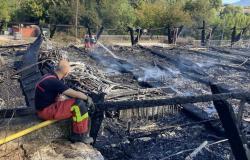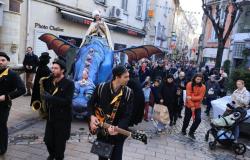Since the start of the 2024 school year, Christophe Glasser has been the new director of Fight Aids Monaco. For Monaco Hebdohe talks about his first months at the head of this association which fights against HIV.
In September 2024, you took over the management of Fight Aids Monaco, after being recruited for a year of transition alongside Hervé Aeschbach: while the latter led the association for its first twenty years, how did this go? handover period?
When I joined Fight Aids Monaco, it was crucial to ensure a smooth transition. Hervé Aeschbach was a key figure in the association for two decades, and his method of support allowed many people to flourish within the structure. We opted for a pair year, so that I could get to know the teams, partners and activities, while preserving the continuity of the work carried out up to that point. This approach was requested by Princess Stéphanie, who wanted to avoid a sudden change, both for the affiliates and for those we support. The objective was therefore to ensure a gradual transition, so that the people who benefit from our support do not feel a break, but rather continuity and constant support. This allowed everyone to adapt to the new direction, while consolidating the solid foundations of Fight Aids Monaco.
During this transition year, you met all the stakeholders and became familiar with the association’s network: what activities are managed by Fight Aids Monaco?
The association is based on three main pillars: support for people living with HIV in Monaco, the Maison de Vie project in Carpentras, and our international missions. These different aspects of our work require meticulous organization and coordination of our actions. In addition to this, we carry out strong prevention and awareness-raising activity. We have campaigns, such as “Test in the City”, which offer free testing to the public, as well as interventions in high schools to educate young people about the risks of HIV and how to protect themselves.
“The association is based on three main pillars: support for people living with HIV in Monaco, the Maison de Vie project in Carpentras, and our international missions”
How is Fight Aids Monaco financed?
One of the particularities of Fight Aids Monaco is that the association operates mainly thanks to donations. These funds allow us to finance our projects and cover the costs linked to our actions, in particular the management of the Maison de Vie. This place is essential because it offers daily support to people living with HIV, without any public assistance. This ability to collect donations is therefore vital to ensure the sustainability of our missions and continue to support the most vulnerable people.

Fight Aids Monaco has just celebrated its 20th anniversary: what are your ambitions for the future of the association?
The coming years will be a period of consolidation and development for us. We aim to continue the support method that has been put in place since the creation of the association, by always placing the person at the center of our actions. It is a model that has proven itself and remains essential for us. At the same time, we wish to intensify our efforts to raise awareness among the general public and raise more funds, in order to guarantee the sustainability of our projects. We would also like Fight Aids Monaco to become, if possible, a “resource” structure for other associations working in the field of health and the fight against HIV. This is a longer-term objective, but we want to share our expertise and experience with other actors who act on similar issues. The most important thing, however, remains to maintain and develop the work that Princess Stéphanie founded, to continue to meet the needs of those living with HIV.
Personally, you are also a municipal elected official in Roquebrune-Cap-Martin: how do you manage to reconcile your schedule, between your responsibilities at Fight Aids Monaco and your public functions?
It’s always a challenge, as it is for many of us. But I am lucky to have a delegation that allows me to work on the economic development of the municipality, without having to directly manage a team. This allows me to juggle my two roles and fully invest myself in my missions. However, it is true that over the years, time management becomes more and more complex. I am near the end of my mandate and, obviously, I will not claim to renew it in 2026, during the next municipal elections. It is important for me to focus on projects that make sense, and my end of mandate at Roquebrune will undoubtedly be a turning point in my career.
“We opted for a pair year, so that I could get to know the teams, partners and activities, while preserving the continuity of the work carried out up to that point. This approach was requested by Princess Stéphanie, who wanted to avoid a sudden change, both for the affiliates and for those we support”
On the question of HIV, an idea that frequently comes up is that we no longer die from HIV thanks to scientific advances?
This idea that we no longer die of HIV is too simplistic, and this statement must be qualified. Of course, there have been remarkable advances in the treatment of HIV, whether with antiretrovirals, post-exposure treatment or even PrEP. Thanks to these treatments, a person living with HIV, under treatment and in good health, can hope to have a life expectancy comparable to that of an HIV-negative person. But that doesn’t mean HIV is a disease of the past. The virus continues to circulate, and many people still do not get tested. It is also crucial to continue to raise awareness among younger generations of the risks of HIV, because the vaccine does not yet exist, and unprotected sex remains a factor of transmission.

What do we still forget too often?
Another aspect that is often overlooked is the stigma that still surrounds HIV. Today, it is no longer a disease associated only with homosexuals or drug addicts, as was the case in the 1980s. And while HIV now affects all populations, and more than 50% of new cases concern women, it is this old image that remains. However, this virus makes no distinction. That’s why one of our most important battles for the years to come is to fight stigma, and make sure people understand that HIV can affect anyone, regardless of their status. their age, gender, or origin.
“Fight Aids Monaco operates mainly thanks to donations. These funds allow us to finance our projects and cover the costs linked to our actions, in particular the management of the Maison de Vie. This place is essential because it offers daily support to people living with HIV, without any public assistance”
You talk about this fight against stigma: as director of Fight Aids Monaco, how do you plan to continue this fight?
One of the main challenges is to get the message across that HIV can affect everyone. We must also continue to raise awareness about the current realities of HIV, particularly with regard to treatments and the notion of undetectability. A person living with HIV and receiving treatment does not transmit the virus. This message is essential. We must hammer home this, because it helps change the perception of this disease and reassure those who are afraid or who are unaware of this reality. In this fight against prejudice, we need awareness campaigns adapted to all audiences. It is fundamental to remove misconceptions and correctly inform the population, whether young people or adults. Moreover, many people, even among the Monegasque population, do not know that life with HIV today is entirely possible, and that those who are under treatment can live normally, and no longer transmit the virus. virus. There is therefore still a lot of work to be done to educate everyone about the reality of HIV 2024-2025, beyond prejudice.
How did you choose to mark World AIDS Day, the 1isDecember 2024, in Monaco?
Like every year, we organized an important event for this awareness day. However, we proposed it on Friday November 29, 2024. The key moment of this day was the deployment of the quilts at the oceanographic museum, in the presence of Princess Stéphanie, still very committed to this fight. This symbolic gesture allows our affiliates to pay tribute to a person who died as a result of HIV. This time of contemplation is essential, because it allows us to remember those who have lost their lives to this disease, but also to remember that HIV is still present, and that it remains a major public health issue. It is a solemn moment, but it is also a moment of awareness and a strong message that it is crucial to share with as many people as possible. World AIDS Day is also an opportunity to highlight our work internationally, as we did recently with the mission in Madagascar. This country, which was the first to benefit from our international aid, is still an important area in the fight against HIV. We will continue to support the most vulnerable, with the same determination.
“I am near the end of my mandate and, obviously, I will not claim to renew it in 2026, during the next municipal elections. It is important for me to focus on projects that make sense, and my end of mandate at Roquebrune will undoubtedly be a turning point in my career”
International: Fight Aids Monaco supports an association fighting HIV in Madagascar
As part of the celebrations of the 20th anniversary of Fight Aids Monaco, Princess Stéphanie traveled to Madagascar in October 2024, marking her return to this country, almost two decades after her first mission with her association. She went to the SISAL Namontana dispensary, in Antananarivo, where she met the staff and beneficiaries of the Malagasy association. The latter fights against sexually transmitted infections (STIs) and HIV, by carrying out awareness and prevention actions among populations at risk. At the end of this meeting, Princess Stéphanie presented a check for 8,000 euros to participate in the intensification of prevention, screening and support efforts. In addition, with the support of Digital Aid, a laptop was offered to help young people find professional activity. The princess also visited the Graines de Bitume school integration clinic, dedicated to the social integration of children, young people and families in very precarious situations. This visit provided an opportunity to discuss issues common to the two associations, such as the fight against the vulnerability and stigmatization of marginalized populations. Christophe Glasser, director of Fight Aids Monaco, was also present during this trip. “Going to the field is essential, he emphasizes. Taking the temperature on site, seeing how we deploy our energy, how we deploy funding, and how we can also adapt our support based on what we see on the ground compared to what had been anticipated, that’s is the key to greater efficiency and intelligent resource management. »





